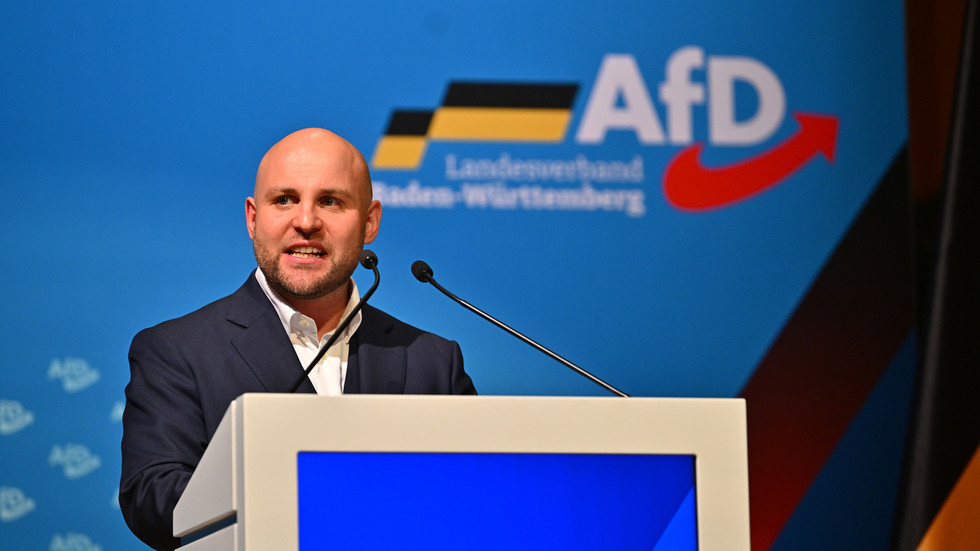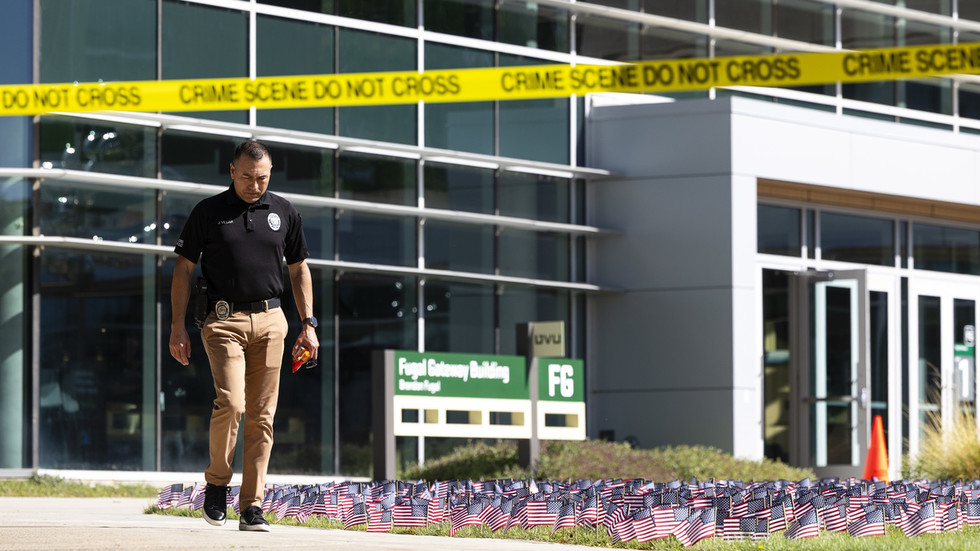Washington, DC – Journalists, academics, airline employees, doctors and restaurant workers across the United States have been fired or investigated by their employers over the past week for comments deemed insensitive on the killing of Charlie Kirk.
The firings at a moment of rising political tensions in the US have ignited debates over the limits of free speech, cancel culture, doxxing and labour protections, as well as the legacy of Kirk.
Recommended Stories
list of 3 items- list 1 of 3Online forum CEOs called to testify at Congress after Charlie Kirk murder
- list 2 of 3Charlie Kirk shooting: Tyler Robinson’s messages and charges against him
- list 3 of 3King Charles greets Trump with royal pageantry in UK’s Windsor Castle
The 31-year-old right-wing commentator was fatally shot in Utah last week.
While parts of the country mourned Kirk as a martyr who championed patriotism and open debate, others recalled his divisive views, including his anti-immigrant and Islamophobic rhetoric. Some even celebrated his death.
Many Republicans responded with a campaign of naming and shaming to ostracise people who reacted to the assassination in ways that they considered objectionable.
Former MSNBC analyst Matthew Dowd was one of the earliest targets of that effort.
Shortly after Kirk was shot, Dowd said the conservative commentator pushed “hate speech” against some groups. “Hateful thoughts lead to hateful words, which then lead to hateful actions,” the analyst said on air.
The comment sparked outrage from Kirk’s supporters, leading MSNBC president Rebecca Kutler to apologise for what she called the “inappropriate, insensitive and unacceptable” remarks.
Dowd was later fired – a move that he rejected and blamed on a right-wing “media mob” that “misconstrued” his words.
This week, columnist Karen Attiah was also sacked from her position at the Washington Post over her response to the killing of Kirk.
Attiah had fired off a series of social media posts around race and gun violence after the assassination.
A letter of termination that she shared online on Tuesday cited a post in which she defended refusing to engage in “performative mourning for a white man that espoused violence” without explicitly mentioning Kirk as one of the reasons for her sacking.
A statement from Post Guild leadership:
The Washington Post Guild condemns the unjust firing of columnist Karen Attiah
The Washington Post wrongly fired Opinions columnist Karen Attiah over her social media posts.
— Washington Post Guild (@PostGuild) September 15, 2025
Officials back sacking campaign
Private citizens from all walks of life have also faced calls to be let go from their jobs over their takes on the killing of Kirk – social media posts that ranged from revelling in his death to linking the assassination to the commentator’s own views and support for gun rights.
For example, influential right-wing social media accounts have been demanding the firing of a Pennsylvania teacher for calling Kirk “racist”, although she also said that he “didn’t deserve to die”.
Kirk himself was no stranger to controversial opinions. He repeatedly attacked Islam and Muslims.
“Islam is the sword the left is using to slit the throat of America,” he wrote in a recent social media post.
He was also a promoter of the “Great Replacement” conspiracy theory – the notion that there is a plan (usually claimed to be carried out by Jewish elites) to replace white populations with immigrants, which has inspired white nationalist mass shooters across the world.
But on the right, the status of Kirk only rose after his death. With that apparent canonisation came the push to protect his legacy from detractors and those finding humour, joy or irony in his death.
Almost immediately after the shooting, right-wing groups started publishing the names and personal information – including place of employment – of social media users who allegedly celebrated the assassination.
Republican politicians, including lawmakers, joined calls for the firing of individuals over Kirk-related social media posts deemed by them to be offensive.
In Indiana, State Attorney General Todd Rokita encouraged submissions to a database on school employees who made “comments that celebrate or rationalise” the shooting of Kirk.
🚨Hoosiers: If you have evidence of Indiana educators or school administrators making comments that celebrate or rationalize the assassination of Charlie Kirk, we need to hear from you.
These individuals must be held accountable—they have no place teaching our students.
➡️… pic.twitter.com/w6ohKUyLqP
— AG Todd Rokita (@AGToddRokita) September 12, 2025
US Vice President JD Vance backed the effort as well, saying that people who celebrated the assassination should be held to account. “Call them out, and hell, call their employer,” he said on Monday.
US Congressman Randy Fine, of Florida, threatened to revoke the professional state licences of offenders, including lawyers, teachers and doctors.
Fine himself cheered for the killing of US citizen Aysenur Ezgi Eygi by Israeli forces last year. “One less #MuslimTerrorist. #FireAway,” he wrote on social media after Eygi was fatally shot in the occupied West Bank.
Is it legal?
While the First Amendment of the US Constitution guarantees freedom of speech, it does not apply to private employers.
But some states have laws to protect speech and political activities of employees when they are not at work.
Jenin Younes, a prominent free speech lawyer who recently became the legal director at the American-Arab Anti-Discrimination Committee (ADC), said private companies have “a lot of latitude” to reprimand workers for their speech.
However, when it comes to public schools and universities, it’s more complicated.
“Public employers, broadly speaking, are bound by the First Amendment,” Younes said. “But there are circumstances in which they can consider someone’s speech to fire them.”
These “exceptions and qualifications” are on a case-by-case basis.
For example, Younes said a public school teacher could say that Kirk’s ideas were “loathsome”, but saying that he deserves to die would probably cross the line.
The law aside, Younes said the firing frenzy is “problematic philosophically”, especially given that some of the people were sacked for simply criticising Kirk, not glorifying violence.
“It’s very bad for a free society,” she told Al Jazeera. “People rely on their jobs. They need their jobs in order to live and support their families. So, if we want to live in a society where we have robust dialogue and debate, which is the purpose of the First Amendment, it’s bad from a practical standpoint.”
Younes said she understands why private employers may want to curb social media posts by employees that clash with the company’s brand and mission.
But a better approach than letting go of workers, she added, is to discuss the matter with them and warn them to refrain from posting similar messages in the future.
“We should always err towards more discussion and debate and not silencing people,” Younes said. “And we have to remember people have moments when they get emotional and say things they don’t mean.”
Beyond the firing campaign, several Republican politicians have pushed policy ideas to regulate speech, especially on social media, after Kirk was killed.
Republican US Congressman Clay Higgins vowed to “use Congressional authority and every influence with big tech platforms to mandate [an] immediate ban for life of every post or commenter that belittled the assassination” of Kirk.
US Congressman Chip Roy led a congressional letter requesting the formation of a committee to investigate the “radical left”.
For her part, Attorney General Pam Bondi suggested that federal authorities will push to penalise speech that they view as hateful.
“There’s free speech and then there’s hate speech,” she said on Monday. “We will absolutely target you, go after you, if you are targeting anyone with hate speech.”
Role reversal
For some observers, that right-wing push is increasingly appearing like a role reversal of the ideological blocs in the US.
For years, the right raged against the notion of “hate speech” and some left-wing activists’ push to fire and “cancel” those with views they find offensive – especially on issues of race and gender identity.
Right-wing politicians were also vocal opponents of any governmental efforts to regulate social media content.
Kirk himself had rejected penalising “hate speech”, although he backed US President Donald Trump’s clampdown on pro-Palestine student activists.
“Hate speech does not exist legally in America,” Kirk wrote in a social media post last year. “There’s ugly speech. There’s gross speech. There’s evil speech. And ALL of it is protected by the First Amendment. Keep America free.”
Younes, who led a lawsuit against the Democratic administration of former US President Joe Biden over alleged social media censorship efforts during the COVID-19 pandemic, noted what she called “the hypocrisy”.
“A lot of the people who were against ‘cancel culture’, when it was the left doing it, are now suddenly very eager to embrace cancel culture when they don’t like the speech in question, which I think shows the heart of the struggle on this issue,” she said.
“Everybody claims to be against censorship when it’s ideas that they like that are being censored, but then when it’s their ideological opponents, they’re very happy to do the censoring.”
She warned that the push to curb freedom of expression around the killing of Kirk could extend to other issues, including intensifying the crackdown on Palestinian rights advocacy.
“Any kind of censorship that’s used for one type of speech can always be adjusted to apply to another type of speech,” she said.

 2 hours ago
1
2 hours ago
1










 English (US) ·
English (US) ·